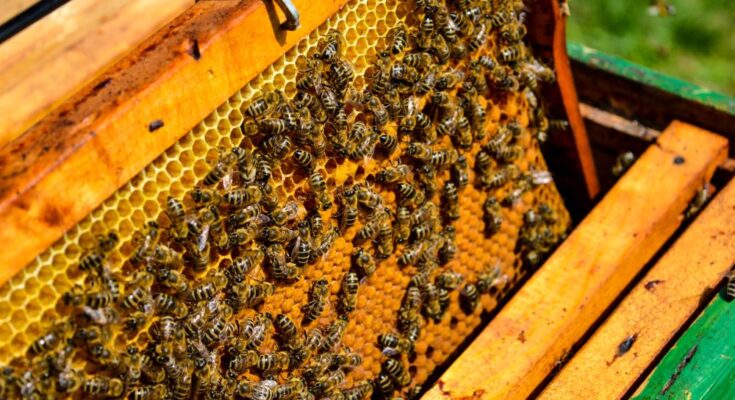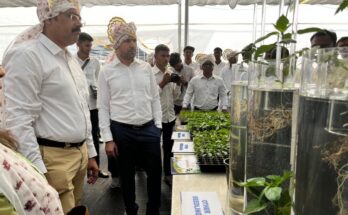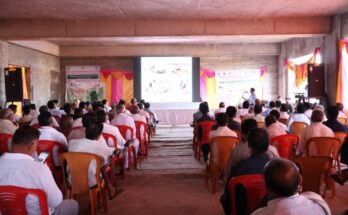Keeping in view the importance of beekeeping as part of the Integrated Farming System in the country, the Government of India has approved the allocation for Rs. 500 crore for National Beekeeping & Honey Mission (NBHM) for three years (2020-21 to 2022-23). NBHM aims for the overall promotion and development of scientific beekeeping in the country to achieve the goal of ‘Sweet Revolution’ which is being implemented through National Bee Board (NBB).
The main objective of NBHM is to promote holistic growth of beekeeping industry for income and employment generation for farm and non-farm households, to enhance agriculture and horticulture production, developing infrastructural facilities, including setting up of Integrated Beekeeping Development Centres (IBDCs) and or Centre-of-Excellence (CoE), honey testing labs, bee disease diagnostic labs, custom hiring centres, Api-therapy centres, nucleus stock, bee breeders, among other related facilities and empowerment of women through beekeeping.
Besides, the scheme also aims to create awareness about scientific beekeeping under Mini Mission-I, post-harvest management of beekeeping, beehive products, including collection, processing, storage, marketing and value addition under Mini Mission-II and research and technology generation in beekeeping under Mini Mission-III. Rs 150.00 crore has been allotted to NBHM for 2020-21.
As many as 11 projects of Rs. 25.6 crore have been sanctioned under NBHM for awareness and capacity building in scientific beekeeping, empowerment of women through beekeeping, technology demonstrations on impact of honeybees on yield enhancement and quality improvements of agriculture and horticulture produce. It also aims to make farmers aware about the distribution of specialised beekeeping equipments for production of high value products, viz. Royal Jelly, Bee Venom and Comb Honey and also about the studies on exploring potential of High Altitude Honey, production of special honey in Kannauj and Hathrus districts of Uttar Pradesh and use of mustard honey to cure colon cancer during the year 2020-21.
Main achievements of National Beekeeping & Honey Mission
- Two world class state-of-the-art honey testing labs, one at National Dairy Development Board (NDDB), Anand, Gujarat and one at ICAR-Indian Institute of Horticultural Research (IIHR), Bengaluru, Karnataka, have been approved/ set up. Lab at Anand has been accredited by National Accreditation Board for Testing and Calibration Laboratories (NABL) and has been inaugurated by Union Minister of Agriculture & Farmers Welfare on July 24, 2020. Now Lab has started testing of honey samples for all the parameters notified by FSSAI.
- Approximately, 10,000 beekeepers, bee and honey societies, firms, companies with 16 lakh honeybee colonies have been registered with NBB.
- Proposal for developing traceability source of honey and other beehive products approved and work started. This will help in controlling the adulteration in honey and other beehive products.
- Farmers, beekeepers have been trained in scientific beekeeping including production of high value beehive products such as bee pollen, propolis, royal jelly, bee venom, among other beekeeping produce.
- Five farmer producer organisations (FPOs) of beekeepers, honey producers in the states of Bihar, Uttar Pradesh, Madhya Pradesh, Rajasthan and West Bengal have been formed and launched on November 26, 2020.
- Honey production has increased from 76,150 MTs (2013-14) to 120,000 MTs (2019-20) which is 57.58 percent increase.
- Export of honey has increased from 28,378.42 MTs (2013-14) to 59,536.74 MTs (2019-20) which is 109.80 percent increase.
- Sixteen Integrated Beekeeping Development Centres (IBDCs) as role model of beekeeping have been commissioned, one each in the states of Haryana, Delhi, Bihar, Punjab, Madhya Pradesh, Uttar Pradesh, Manipur, Uttarakhand, Jammu & Kashmir, Tamil Nadu, Karnataka, Himachal Pradesh, West Bengal, Tripura, Andhra Pradesh and Arunachal Pradesh.
- Awareness created about role of honeybees and beekeeping in pollination support of various crops and adoption of scientific beekeeping.
It is an agro-based activity which is being undertaken by farmers and landless labourers in rural areas as a part of Integrated Farming System (IFS). Beekeeping has been useful in pollination of crops, thereby, increasing income of the farmers and beekeepers by way of increasing crop yield and providing honey and other high value beehive products, such as bees wax, bee pollen, propolis, royal jelly, bee venom, among others. Diversified agro-climatic conditions of India provide great potential and opportunities for beekeeping and honey production and export of honey.
(The information provided in the article is based on a press statement by Ministry of Agriculture & Farmers Welfare, Government of India on PIB portal.)
 Agriculture Post is now on Telegram. Click here to join our channel and stay updated with the latest news and updates on agriculture.
Agriculture Post is now on Telegram. Click here to join our channel and stay updated with the latest news and updates on agriculture.




